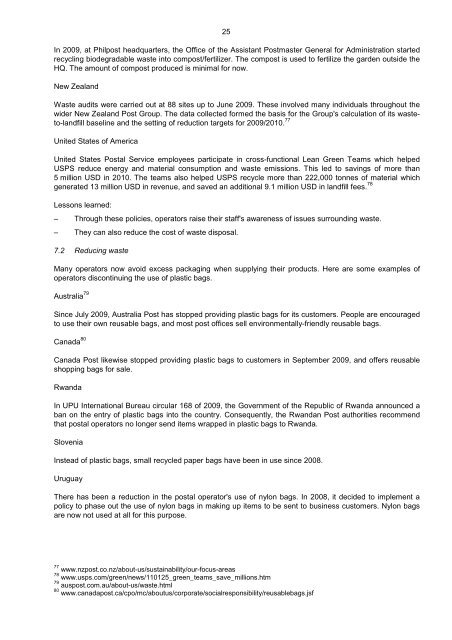ENG - UN CC:Learn
ENG - UN CC:Learn
ENG - UN CC:Learn
Create successful ePaper yourself
Turn your PDF publications into a flip-book with our unique Google optimized e-Paper software.
25<br />
In 2009, at Philpost headquarters, the Office of the Assistant Postmaster General for Administration started<br />
recycling biodegradable waste into compost/fertilizer. The compost is used to fertilize the garden outside the<br />
HQ. The amount of compost produced is minimal for now.<br />
New Zealand<br />
Waste audits were carried out at 88 sites up to June 2009. These involved many individuals throughout the<br />
wider New Zealand Post Group. The data collected formed the basis for the Group's calculation of its wasteto-landfill<br />
baseline and the setting of reduction targets for 2009/2010. 77<br />
United States of America<br />
United States Postal Service employees participate in cross-functional Lean Green Teams which helped<br />
USPS reduce energy and material consumption and waste emissions. This led to savings of more than<br />
5 million USD in 2010. The teams also helped USPS recycle more than 222,000 tonnes of material which<br />
generated 13 million USD in revenue, and saved an additional 9.1 million USD in landfill fees. 78<br />
Lessons learned:<br />
– Through these policies, operators raise their staff's awareness of issues surrounding waste.<br />
– They can also reduce the cost of waste disposal.<br />
7.2 Reducing waste<br />
Many operators now avoid excess packaging when supplying their products. Here are some examples of<br />
operators discontinuing the use of plastic bags.<br />
Australia 79<br />
Since July 2009, Australia Post has stopped providing plastic bags for its customers. People are encouraged<br />
to use their own reusable bags, and most post offices sell environmentally-friendly reusable bags.<br />
Canada 80<br />
Canada Post likewise stopped providing plastic bags to customers in September 2009, and offers reusable<br />
shopping bags for sale.<br />
Rwanda<br />
In UPU International Bureau circular 168 of 2009, the Government of the Republic of Rwanda announced a<br />
ban on the entry of plastic bags into the country. Consequently, the Rwandan Post authorities recommend<br />
that postal operators no longer send items wrapped in plastic bags to Rwanda.<br />
Slovenia<br />
Instead of plastic bags, small recycled paper bags have been in use since 2008.<br />
Uruguay<br />
There has been a reduction in the postal operator's use of nylon bags. In 2008, it decided to implement a<br />
policy to phase out the use of nylon bags in making up items to be sent to business customers. Nylon bags<br />
are now not used at all for this purpose.<br />
77 www.nzpost.co.nz/about-us/sustainability/our-focus-areas<br />
78 www.usps.com/green/news/110125_green_teams_save_millions.htm<br />
79 auspost.com.au/about-us/waste.html<br />
80 www.canadapost.ca/cpo/mc/aboutus/corporate/socialresponsibility/reusablebags.jsf

















